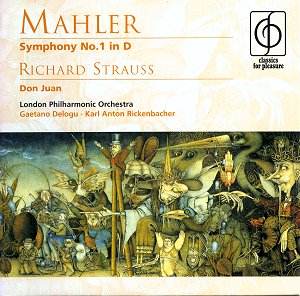With the big names pulling out all the stops to score
points over Naxos, well-filled reissues these days often include interesting
bonuses and fill-ups. My first thought on encountering this CD was to
doubt the wisdom of coupling such different pieces, however generous the
timings. But oneís second thoughts were bound to be different. Don
Juan was Straussís first real success, or at least the earliest piece
for which he is widely known: likewise Mahlerís First Symphony. Both pieces
date from 1889. Theyíre both hugely impressive orchestral showpieces.
And each, in its very different way, is profoundly characteristic of its
composer.
Musicologists (or rather music-lovers) like to gather
composers into contemporary pairs. We so often talk of Handel and Bach,
Mozart and Haydn, and Debussy and Ravel; and such marriages persist
in our imaginations despite the contrasts far outnumbering the similarities.
Likewise Strauss and Mahler, who were in truth opposites. Don Juan
is almost overpoweringly energetic, dashing, flamboyant music; music
which seems to have no time to pause for breath. On the other hand,
Mahlerís First Symphony (which the composer referred to as a "symphonic
poem in the form of a symphony") seems to have all the time in
the world to make its point. From its mysterious dawn-like opening to
its emphatically defiant closing pages, everything unfolds at an evolutionary
pace. Of course there are parallels to be drawn also Ė the ghost of
the Viennese classical past in Straussís sonata-like structure and in
the dance rhythms of Mahlerís inner movements; both composersí fondness
of obviously vocal song-like episodes; and the virtuosity, colour and
weight of orchestration which both pieces share.
This Don Juan is a swaggering and dazzling performance
in first-rate digital sound Ė brightly lit rather than weighty, but
in a wide-open acoustic which allows plenty of detail through. Be warned
that Rickenbacher takes everything at a cracking pace (but how well
the orchestra keep up with him!) even to the extent of foregoing the
traditional slowing down into the recapitulated horn theme: if youíre
used to a more expansive approach here, you may find this a bit
of a let down!
The Mahler isnít quite in the same league, though I
couldnít possibly describe it as routine. The orchestral playing and
the sound (analogue, but you really canít tellÖ) are both admirable,
and thereís plenty of warmth and excitement. But I miss the sense of
complete involvement, of personal identity with Mahlerís subtext which
comes across so compellingly in (say) Bernsteinís live reading with
the Concertgebouw, where every phrase and gesture is pregnant with meaning.
In the opening pages of Deloguís LPO performance, by comparison, Mahlerís
birdcalls seem little more than mere musical fragments: and, although
the strings are undoubtedly expressive in the finaleís two passionately
lyrical episodes, you wonít hear much of Mahlerís pain or yearning.
So an interesting coupling, but Ė though the Strauss
is a winner Ė I canít honestly give the Mahler reading an unqualified
thumbs-up in such a competitive market, even at bargain price.
Peter J Lawson


